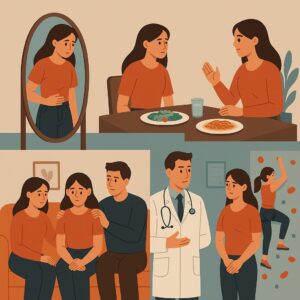How to Support Teens Through Eating Disorders and Body Image Issues
Teenage years bring massive changes. Bodies develop rapidly, social pressures intensify, and many young people start questioning their self-worth based on appearance. Unfortunately, this toxic combination can lead to eating disorders and serious body image problems that affect millions of teenagers across the UK.
These issues aren’t just phases. They’re real medical conditions requiring proper support and treatment. As parents and carers, you’re on the front line, which means learning to spot warning signs, creating supportive environments, and knowing when professional help becomes necessary.
Spotting the Warning Signs
Physical changes often appear first:
- Dramatic weight fluctuations (in either direction)
- Constant fatigue or dizziness
- Hair thinning or brittle nails
- Feeling cold all the time
- Irregular or missed periods in girls
Behavioural shifts follow close behind. Your teenager might start avoiding social events that involve food, exercising obsessively (e.g. running for hours daily), or developing rigid food rules such as only eating certain colours or textures. They could begin weighing themselves multiple times per day, checking their reflection constantly, or hiding food in their bedroom.
Emotional warning signs are equally important. Mood swings around mealtimes. Anxiety when discussing body image. Social withdrawal from friends and family activities they previously enjoyed.
Making Home Feel Safe
Family meals matter enormously, so make them pressure-free zones where conversation flows naturally without commentary on food choices or portion sizes. Stock your kitchen with variety (fruits, vegetables, proteins, carbohydrates) whilst avoiding labels like “good food” versus “bad food” because these create guilt and shame around eating.
If you are a foster carer, you may have children arrive with particularly complex relationships with food due to past experiences of scarcity or control, which means creating this neutral environment becomes even more crucial for their recovery and wellbeing. It’s a good idea to work closely with your foster agency when making any changes.
Create routines around meals since structure helps anxious teenagers feel more secure. However, flexibility remains important too. Rigid schedules can sometimes worsen eating disorder behaviours.
Talking without Making Things Worse
Start conversations with observations rather than accusations (i.e. “I’ve noticed you seem worried during dinner” instead of “You’re not eating enough”). Listen actively when they respond. Really listen. Don’t immediately jump to solutions or dismiss their concerns as teenage drama because validation often matters more than advice initially.
Ask open questions such as “How are you feeling about your body lately?” rather than yes/no questions which shut down communication. Avoid power struggles around food since these typically backfire and damage trust between you and your teenager.
Short responses work sometimes. Long lectures rarely do.
Getting Professional Help
Your GP should be your first contact when warning signs persist beyond a few weeks. They can assess physical health, rule out medical causes, and provide referrals to specialist eating disorder services which exist across most UK regions.
Treatment options vary significantly:
- Family-based therapy (involving everyone in the household)
- Individual counselling focusing on underlying emotional issues
- Group therapy with other teenagers facing similar challenges
- Medical monitoring for serious physical complications
- Nutritional counselling to rebuild healthy eating patterns
Don’t wait for things to get “bad enough”. Early intervention dramatically improves outcomes since eating disorders become more entrenched over time.
Building Body Positivity and Self-Esteem
Encourage activities that celebrate what bodies can do rather than how they look. Sports, dance, martial arts, rock climbing – physical activities that focus on strength, skill, and enjoyment rather than appearance or weight loss.
Model positive self-talk around your own body because teenagers absorb everything you say about yourself. Complaining about your weight, criticising your appearance in mirrors, or constantly dieting sends powerful messages to impressionable young people.
Celebrate achievements unrelated to appearance, such as academic success, creative projects, acts of kindness, or personal growth milestones. Help them develop identity beyond physical attributes.
Supporting teenagers through eating disorders requires patience, professional guidance, and consistent love. These aren’t problems you can solve with willpower or good intentions alone; they’re serious mental health conditions requiring proper treatment. However, with early recognition, appropriate support, and professional help when needed, young people can recover completely and develop healthy relationships with food and their bodies that last lifetimes.


